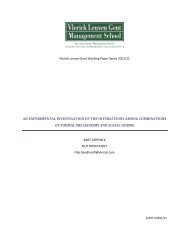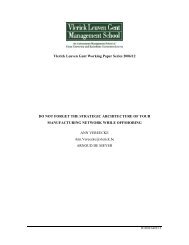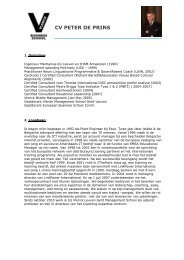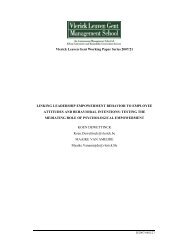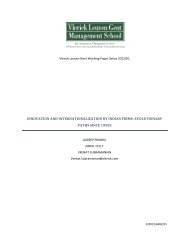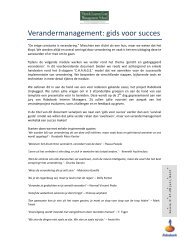Vlerick Leuven Gent Working Paper Series 2007/03 ... - Vlerick Public
Vlerick Leuven Gent Working Paper Series 2007/03 ... - Vlerick Public
Vlerick Leuven Gent Working Paper Series 2007/03 ... - Vlerick Public
You also want an ePaper? Increase the reach of your titles
YUMPU automatically turns print PDFs into web optimized ePapers that Google loves.
Defining board effectiveness<br />
Literature reveals that there exist multiple approaches to determine the concept of<br />
effectiveness due to the scholars’ different background and their heterogeneous research<br />
purposes (Van den Berghe and Levrau, 2004; Kuo, 2004). In their seminal article Hackman<br />
and Morris (1975) set out three criteria of group effectiveness: group performance, the ability<br />
of the group to work together over time and the satisfaction of the personal needs of group<br />
members. This definition includes the classic “task” (group-produced) and “maintenance”<br />
(attitudinal) criteria and are commonly used in research on work groups (Gladstein, 1984;<br />
Jehn, 1995; Cohen and Bailey, 1997; Lemieux-Charles et. al., 2002). Applied to the context of<br />
boards of directors, board effectiveness is mainly concerned with “task” outcomes and occurs<br />
by fulfilling a role set (Nicholson and Kiel 2004). The latter is, however, still subject to<br />
considerable debate in literature. The role set is often not defined as an integrated set of<br />
activities. In contrast, based on diverging theoretical assumptions, the role of the board is<br />
conceptionalized in a multiple, and in some cases contradictory, way (Johnson et.al., 1996;<br />
Hung, 1998). Commonly accepted and used is the classification into three broadly defined<br />
roles: control, service and strategic role (Zahra and Pearce, 1989; Maassen 1999).<br />
Regarding the control role, the board of directors has a legal duty to provide oversight<br />
and is expected to carry out this duty with sufficient loyalty and care. Particularly, in Anglo-<br />
American countries it is emphasised that the board has a fiduciary duty to oversee the<br />
company’s operations and monitor top management performance in order to protect<br />
shareholders’ interests (Lorsch and MacIver, 1989). The board’s duty to monitor management<br />
and corporate performance has also been addressed in other disciplines than law. In particular,<br />
the dominant theory underlying the control role of the board is agency theory, initially the<br />
prevailing school of thought in finance and economic research This theory is concerned with<br />
resolving problems that may occur in the relationship between two major parties, the principal<br />
(owner) and agent (the manager) (Eisenhardt, 1989). First identified by Adam Smith (1776)<br />
in his commentary on joint stock companies and further elaborated in the twentieth century by<br />
the influential work of Berle and Means (1932) and Jensen and Meckling (1976), agency<br />
problems stem from the separation of ownership and control. The latter leads to a decision<br />
process in which “the decision managers who initiate and implement important decisions are<br />
not the major residual claimants and therefore do not bear a major share of the wealth effects<br />
of their decisions” (Fama and Jensen 1983:5).<br />
10



